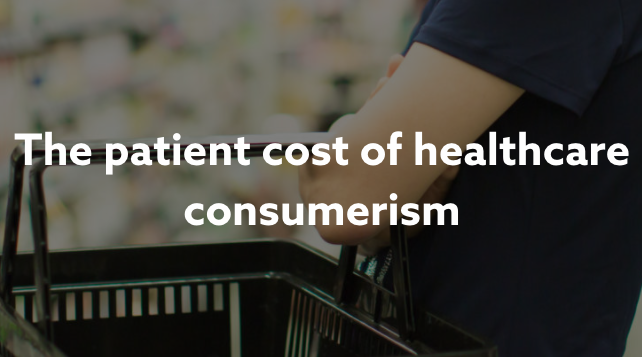
Consumerism is rapidly becoming a driving force in healthcare. According to one survey, consumerism was second only to industry consolidation as most top of mind for healthcare professionals. While healthcare consumerism may be topical, there’s still a lack of consensus as to what it means. Many see healthcare consumerism as patients weighing the costs and benefits associated with any healthcare purchase, similar to buying a car or a pair of shoes, but that perception is misguided. Simply put, healthcare is not packaged goods.
Healthcare consumers don’t shop for products. Instead, they buy desired outcomes. When consumers buy consumer goods, they are buying a product. They generally understand what it is, what it will do for them, and they have sufficient information to enable them to purchase with confidence. While a sports car can produce a different outcome than a pickup truck, and stiletto heels carry different connotations than a pair of flats, these products play a different role in the life of a consumer than healthcare.
A patient undergoing a knee replacement, because he wants to walk without pain, doesn’t choose a type of artificial joint based on a sleek ad or to feel good about themselves. In healthcare, products like an artificial joint reside with/in our bodies, not on our sleeves, and the outcomes dictate quality of life, not brand associations.
Healthcare consumers need the support of experts to make purchase decisions. A patient may know his knee hurts, but navigating treatment options alone, or with the help of a medical product salesperson, would not be advisable. Perhaps steroid injections are the best route to becoming ambulatory, or maybe physical therapy? He is reliant on trusted professionals to guide him based on his unique circumstances. The consumer doesn’t order a knee replacement like he would the latest pair of Nike basketball shoes. And doctors don’t accept patient desires on face value, regardless of how much research the consumer did beforehand. Even if the consumer and doctor agree that a knee replacement is needed, it is up to the doctor to guide decision-making around what medical devices will be used and what surgical procedure will be followed. The consumer gives consent, but he trusts the doctor to deliver the desired outcome.
In healthcare, consumers rarely know the full cost. To create this concept of consumerism, much of healthcare’s focus has relied on making the consumer more responsible for a larger portion of their healthcare costs. This has been done through increasing consumer cost with high deductible healthcare plans (HDHPs). The theory is that if the consumer needs to pay more out of pocket, they will be more judicious in their healthcare purchases. But that is too simplistic a view. It assumes that the consumer has all the knowledge needed, full understanding of viable alternatives and control over the price paid. In fact, those three conditions almost never exist.

In our knee replacement example, the consumer never has full knowledge of all the options available to him and their associated costs. Although the doctor may share potential alternatives, those given are limited to the doctor’s preferences and may not include options that the doctor is discounting. And although some costs may be disclosed up-front, the consumer rarely knows the full cost (or even has choices) associated with the procedure, including other personnel needed, resources (including supplies, meds) deployed, and the insurance network status of all involved (e.g. is the anesthesiologist who was not chosen by the consumer in-network or out-of-network).
Doctors don’t know either. According to a June 2020 study prepared for the Physicians Advocacy Institute by the NORC at the University of Chicago, although 75% of patients ask about the cost of care, only 15% of doctors believe they are very prepared to have that discussion.
Healthcare consumerism defined solely by putting more costs in the hands of patients who are not fully equipped to make healthcare decisions is flawed and short-sighted. In its current state, healthcare consumerism is actually resulting in worse outcomes: patients are postponing care due to cost; they’re being saddled with unexpected bills; and the U.S. is spending more while getting less compared to other countries. Consumers should be upset. There are better ways to move toward consumerism in healthcare.
See how you can integrate the consumer experience with brand loyalty.

Stephanie Cohen serves as Senior Loyalty Strategist, Integrated Loyalty Solutions at PK, where she leads loyalty engagements to deliver innovative and bespoke loyalty strategies and experiences to customer-obsessed brands and their customers. Working with clients across industries, she is responsible for ensuring that clients meet their objectives and improve customer loyalty, engagement and profitable behaviors.
The original version of this page was published at: https://pkglobal.com/blog/2020/07/healthcare-consumerism/
Concentrix Catalyst is the experience design and engineering team of Concentrix, a leading global solutions company that reimagines everything CX through strategy, talent, and technology. We combin... Read more
Demand for telehealth set to soar 65%. $250b to shift to telehealth after COVID-19. Telehealth forecasted to grow sevenfold by 2025. Telehealth claim lines increased 4,347% nationally.These ...read more
While nothing can replace face-to-face communication, especially when it comes to teamwork, COVID-19 is forcing most organizations to rethink how they’re going to conduct planning ...read more
It’s one of life’s frustrations: No matter who you are, some of the smartest people will always be working for someone else. So, in this big world, no matter how great ...read more
Every healthcare and hospital system across the globe currently find themselves challenged by COVID-19. Consequently, value-based care and healthcare efficacy have taken a back seat ...read more